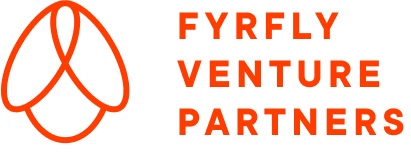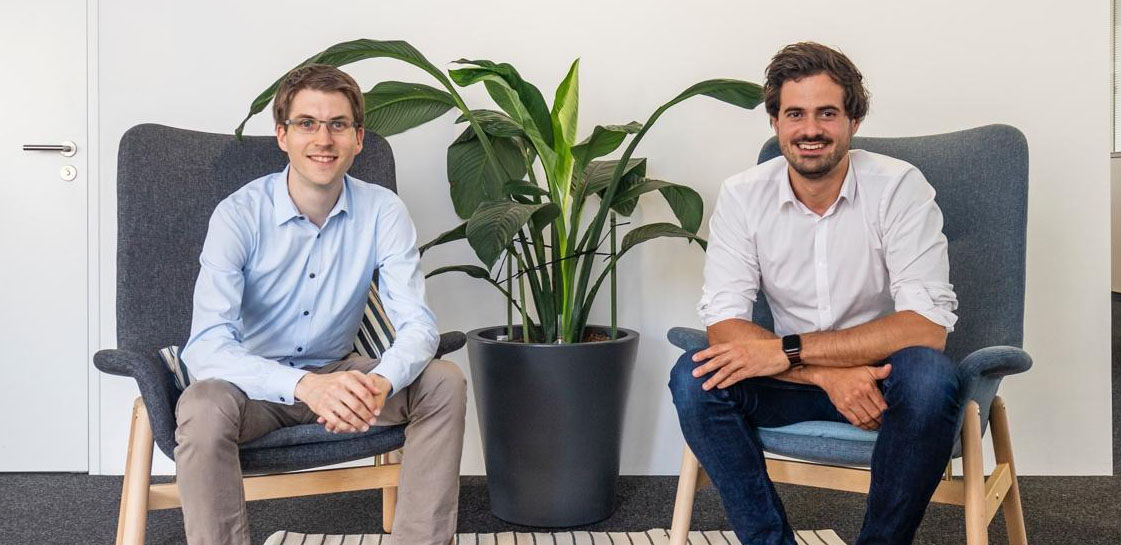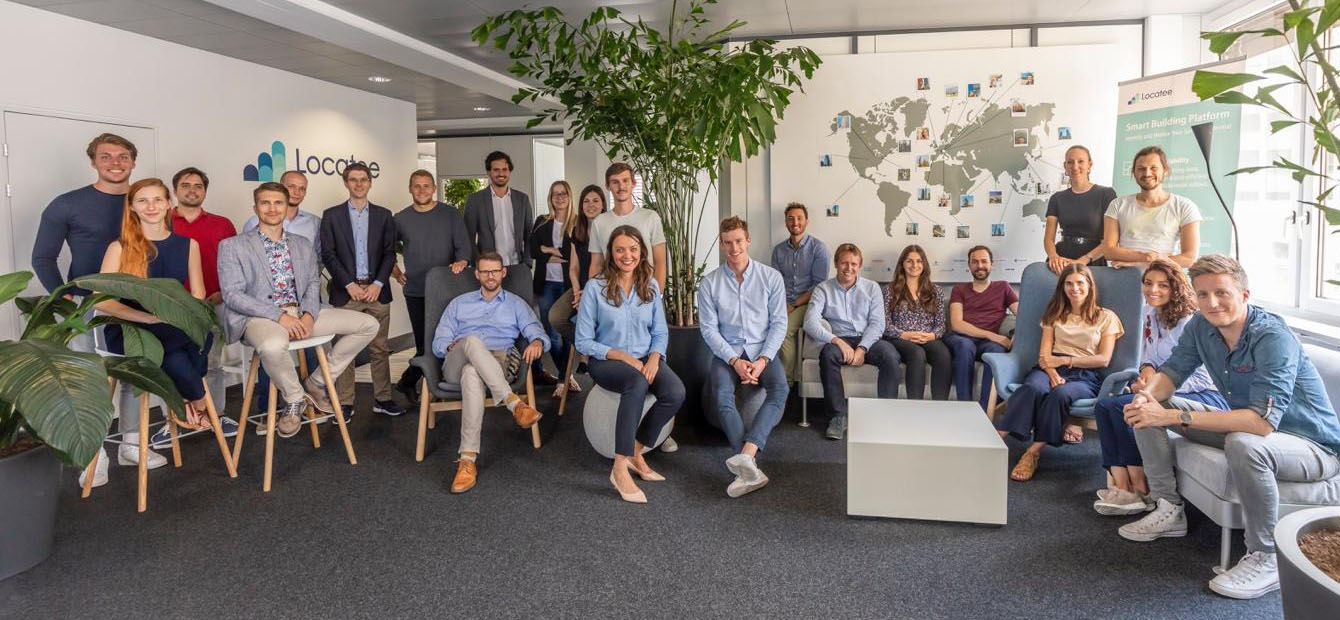Entrepreneurship
What is your founder story?
Before founding Locatee, my co-founder Benedikt and I worked at UBS and Credit Suisse. Both banks had been introducing modern working environments where people no longer had their own desks and could freely roam around the office building. We experienced first-hand as employees that this modern concept was not without its challenges.
Benedikt found himself being constantly approached by colleagues asking where his colleagues were. Frustrated by this, he realized that he would be able to answer the question very easily by querying the company’s computer network. Meanwhile, I was at Credit Suisse and realized that students were walking around the office manually counting the number of coworkers in the building. Curious about this labor-intensive exercise, I approached the responsible manager and found out that she was using the data points to estimate how many people could still fit into the building, when to make adjustments to workplace settings, and for planning the distribution of desks and meetings rooms.
While grabbing a beer at our favorite restaurant, we realized that the identified challenges shared a common theme: a lack of transparency in the workplace. The challenge of finding a colleague in a large office building reflected the lack of transparency in who is using the space, and the inefficiency of manual counting reflected a lack of transparency in how the space is being used. We also realized that both challenges could be solved through the same technology, based on already available data. While Benedikt started programming the first prototype for what would be known as Locatee Workplace Analytics, I went on to test the market and began initiating conversations with potential customers. This confirmed our gut feeling that Workplace Analytics was key to unlocking huge savings potentials lying uncovered in the real estate portfolio of enterprises and led to the founding of Locatee.
What is your greatest learning as a founder and entrepreneur so far?
Focus is very important. Startups, by virtue of their early development stage, are constantly faced with countless options. At the beginning, customers might present you with hundreds of problems and product suggestions. But also, later on, for instance when expanding, there are so many different paths you could pursue. This all is only compounded by the fact that startups usually find themselves in emerging and dynamic markets where there still are a lot of unknowns, few rules, and plenty of options. Here it’s important to stay focused. The specific focus of course depends on criteria such as the customer, market, or business model, but it always comes down to your core customers and their greatest pain points and frequently involves saying “no”. A great book to read in this context is Geoffrey Moore’s Crossing the Chasm.
One crucial point I would add to this is that it’s not only about choosing the right focus, but also about communicating it effectively with your team. Without a cohesive team that pursues that focus with you, you’ll get nowhere. And this of course should not stand in conflict with keeping an open mind and encouraging unrestricted ideation around that focus.
Tell us about a turning point…
There are two turning points that come to mind that were key to where we stand today.
Our first important turning point was when we could confirm that our Workplace Analytics solution is solving a recurring pain point. Historically, our customers were used to conducting one-off manual studies, and it took us some time to figure out which of their pains were strong enough for payment on a recurring basis. After identifying these pains and iterating accordingly, we were then able to adopt a typical SaaS pricing model with multi-year subscriptions.
The other turning point was the shift in terms of how we deploy our solution from on-premise to the cloud. This was crucial for various reasons such as scalability, pace of expansion, speed of innovation and closeness to our customers.
Person
As a founder, what are your most important learnings about leadership?
Two come to mind for me. First, as a founder you set the pace and expectations, but for people to follow, you have to be empathetic. You have to understand how your team feels and always communicate the “why”. Why should they care? This is where a meaningful mission comes into play. For us, we see ourselves as helping companies create places where employees love to work, and we strive to integrate this into everything we do and thereby be a mission- & result-driven company.Besides being mission-driven, it’s important to foster an environment of transparency and open communication. The success of a startup depends on its agility or ability to adapt, and this is only possible through feedback. At Locatee I therefore encourage all employees, including our most junior employees, to challenge everything and speak up.
What is your favorite book/podcast and why?
Two books that are a must-read for every startup founder are The Lean Startup by Eric Ries and Crossing the Chasm by Geoffrey A. Moore. While The Lean Startup provides a framework for how to create an innovative product in a lean way, Crossing the Chasm gives a framework to sell an innovative product to the mass-market. What fascinates me the most about Crossing the Chasm is that even though the first edition of the book was published in 1991, in the “stone age” of internet technology, the framework fully applies today. Both books greatly influenced the team and me to build Locatee to the point where we are today.
My favorite podcast is “How I Built This” by Guy Raz on NPR – great to hear the founding stories of Instagram, Patagonia or Airbnb. Big learnings and inspiration guaranteed.
If you weren’t a founder, what would you be doing?
In general, I am fascinated by the possibility of creating something you can see & feel from as little as an idea. Therefore, if I weren’t a founder, I think I might be an architect – I am intrigued by how architects determine how we perceive and feel space through their designs. In a way, this is also quite similar to Locatee as we visualize how employees behave indoors and help companies create environments that employees enjoy.
Fun
If you could travel back in time, who would you want to chat with and what would you ask?
I would probably go back and meet Leonardo da Vinci around 1500, let him know which of his inventions made it into the 21th century and try to learn from him with regard to future inventions. I would ask him over a glass of wine: “With all the knowledge on what has happened between the 15th and the 21st century now, what do you think should be invented in 2020 that will be still around 500 years later?”
What is your favorite job interview question?
I like to ask candidates what they are truly passionate about. I’m not looking to hear something related to Locatee – it can be something entirely unrelated. The passion someone has tells you a lot about their personality including their enthusiasm and ability to learn.
EXTRAS
Favorite book as a child?
The Adventures of Tintin
Favorite movie?
Snatch is a good one
Favorite cocktail?
Negroni
Something really unique, funny, and/or something no one would know about you
Can’t stand cheese (quite uncommon as someone from the deep Swiss Alps) 🙂


